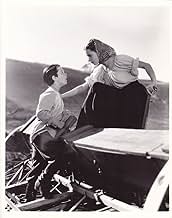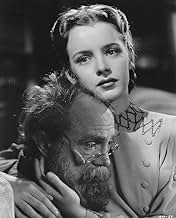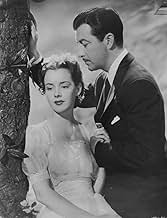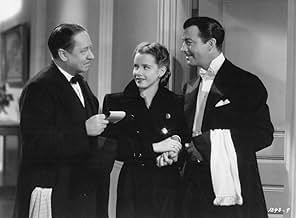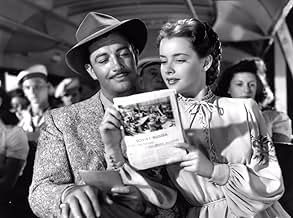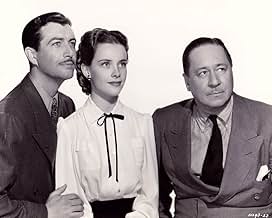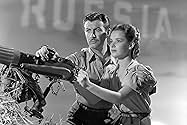Aggiungi una trama nella tua linguaPropaganda film from WW2, designed to raise the awareness of the American public regarding USSR's fight against Nazi Germany.Propaganda film from WW2, designed to raise the awareness of the American public regarding USSR's fight against Nazi Germany.Propaganda film from WW2, designed to raise the awareness of the American public regarding USSR's fight against Nazi Germany.
- Regia
- Sceneggiatura
- Star
- Premi
- 2 vittorie totali
Konstantin Shayne
- Wounded Soldier
- (as Konstantine Shayne)
John Wengraf
- Red Army Commander
- (as John E. Wengraf)
Recensioni in evidenza
"Song of Russia" was never made to accurately portray Soviet peasantry, but rather to enlighten the West of the Anti-Nazi plight of the Russian citizens.Director Gregory Ratoff is no more guilty of tainting the truth for entertainment's sake than were many American directors for their careless, racist portrayal of the "savage" American Indian.
Stalin and Hitler were both maniacal murderers, but in 1943 much less was known of the atrocities these two leaders committed. If Western leaders had known better in 1943, greater efforts should have been made to stop the bloodshed. 20/20 hindsight gives us great power to criticize filmmakers of that period, but what of Roosevelt and Churchill? What did they know, and what did they do about it?
"Song of Russia" was a warning and a call for help.Although Russian peasants weren't as "Americanized" as the film portrays, they did defend their land against the fascists and lost over 20 million people doing it.I enjoyed the film, and yes, I thought the peasants looked a bit well-to-do for the period, but that helped me imagine what we as Americans might have confronted if the Nazis had made it past England and Russia.
Stalin and Hitler were both maniacal murderers, but in 1943 much less was known of the atrocities these two leaders committed. If Western leaders had known better in 1943, greater efforts should have been made to stop the bloodshed. 20/20 hindsight gives us great power to criticize filmmakers of that period, but what of Roosevelt and Churchill? What did they know, and what did they do about it?
"Song of Russia" was a warning and a call for help.Although Russian peasants weren't as "Americanized" as the film portrays, they did defend their land against the fascists and lost over 20 million people doing it.I enjoyed the film, and yes, I thought the peasants looked a bit well-to-do for the period, but that helped me imagine what we as Americans might have confronted if the Nazis had made it past England and Russia.
Revisionist history can prove unfortunate. There is very little that moves along with apparent 'truth' in this film, BUT it was made at a critical time in our history -- a time when it was necessary to create unity between those fighting the horrors of Nazism. No, the film is not a very good one, but it is a formidable piece of history and should be watched with the adult comprehension of the time. And there is absolutely NO EXCUSE for the wreckage wrought by McCarthy-Cohn and their henchpeople during the Red Scare era that destroyed lives!! No excuse at all. As for SONG OF RUSSIA, it should also survive as a reminder of the screen aura of Susan Peters. (As for her true abilities, watch this one and then SIGN OF THE RAM!!) Along with the obvious propoganda about the 'perfect' society of the USSR, the worst part of this film, of course, is the usually awful performance of Robert Taylor, whose post-War attitudes were those of a true coward, as well as a lousy actor.
Thanks to TCM for airing this astounding propaganda film in October 2003. Others have commented on the nearly unbearable Soviet propaganda in the film, but I watched the Stalin-supplied footage with awe as I had never seen most of it before, at least in this quality and quantity.
The story is stock melodrama with the morals that we (America) must support our Russian allies at all costs and that the scorched earth policy is major war strategy.
But through it all is the luminous face of Susan Peters, who was tragically paralyzed two years after this film's release and died in 1952. She is charming, delightful and disarming enough to inspire a whole village as well as the American conductor (Robert Taylor) who falls in love with her. They marry in an unlikely semi-religious ceremony.
The notions that 1.)An American would be invited on a 40-city tour of Russia in early 1941, and 2.)That he would be able to take his Russian bride out of the Soviet Union (after the German invasion!) "for the greater good of Mother Russia," are pure fantasy. The huge symphony orchestras and the vast, aristocratic, jewel-bedecked audiences we see at theatre after theatre are laughably anti-communist, and the men would most likely have been conscripted by that time.
Yet, as films reflect the history of our lives, I found this a fascinating chapter of the very brief period of US/USSR alliance. I'd love to see it again.
The story is stock melodrama with the morals that we (America) must support our Russian allies at all costs and that the scorched earth policy is major war strategy.
But through it all is the luminous face of Susan Peters, who was tragically paralyzed two years after this film's release and died in 1952. She is charming, delightful and disarming enough to inspire a whole village as well as the American conductor (Robert Taylor) who falls in love with her. They marry in an unlikely semi-religious ceremony.
The notions that 1.)An American would be invited on a 40-city tour of Russia in early 1941, and 2.)That he would be able to take his Russian bride out of the Soviet Union (after the German invasion!) "for the greater good of Mother Russia," are pure fantasy. The huge symphony orchestras and the vast, aristocratic, jewel-bedecked audiences we see at theatre after theatre are laughably anti-communist, and the men would most likely have been conscripted by that time.
Yet, as films reflect the history of our lives, I found this a fascinating chapter of the very brief period of US/USSR alliance. I'd love to see it again.
"Song of Russia" is far from a great film, but it is really fascinating to look at nowadays, both as a historical time capsule and as an excellent specimen of MGM camp. The film was designed to drum up sympathy for our then-allies, the Soviet Union, and is sheer, unabashed propaganda. It is well-enough made, but, meaning no disrespect to the millions of Russians who suffered and died during the war, it is so cornball and manipulative seen now that its difficult to take seriously. In fact, its most famous now for the after-effects of its release at the end of the 40's in the HUAC meetings where Robert Taylor testified and "named names" and where it caused all sorts of problems for its makers. Robert Taylor rises to his usual heights of bland adequacy here, but Susan Peters, a tragic actress if ever there was one, does quite well as his Russian bride.
Some of the more hilarious scenes include a wedding dance where the entire village takes part and come across more like a Broadway troupe with decades of experience and the depiction of the "typical" Russian village,which looks like a Slavic version of Andy Hardy's small town. Miss Peters character is also quite the Russian Superwoman - a concert pianist who can cook a mean dinner when she's not riding tractors, shooting machine guns and teaching a class of schoolchildren how to make a Molotov Cocktail. Its amazing she was able to be convincing in the slightest degree in this role, but she does as well as anyone could.
Some of the more hilarious scenes include a wedding dance where the entire village takes part and come across more like a Broadway troupe with decades of experience and the depiction of the "typical" Russian village,which looks like a Slavic version of Andy Hardy's small town. Miss Peters character is also quite the Russian Superwoman - a concert pianist who can cook a mean dinner when she's not riding tractors, shooting machine guns and teaching a class of schoolchildren how to make a Molotov Cocktail. Its amazing she was able to be convincing in the slightest degree in this role, but she does as well as anyone could.
Who knew that life under a brutal totalitarian regime could be so carefree? Even though the film was made for World War II propaganda purposes, the inanities that litter this film have to be seen to be believed. (That would be difficult, I know, since it is not available on videotape. or DVD.)Among the aspects of Russian life, circa 1941, to which this film introduces us are: town meeting democracy, freedom of religion, rural peasants who eat hearty meals at tables set with china, crystal and silver, and on and on. Soviet barbarities are played down or, more usually, ignored altogether. I saw this film in Washington around 1983 as part of a twin bill with the other infamous WWII paeon to Stalin's Russia, "Mission to Moscow." I think the latter was, in places, at least a bit more honest than this rose-colored clunker. If ever you wondered why Congress went hunting for Communists in Hollywood, check out these two films.
Lo sapevi?
- QuizDebut of actress Joan Lorring.
- BlooperAlthough the film is set during the Axis invasion of the Soviet Union in 1941, uniforms and equipment shown in both the stock footage and the American-filmed scenes are largely from the period of 1943-44, when the film was made. Of particular note are the helmets and rank insignia which are indicative of this later era.
- ConnessioniFeatured in Red Hollywood (1996)
- Colonne sonorePiano Concerto No.1 in B flat minor, Op.23
(uncredited)
Music by Pyotr Ilyich Tchaikovsky
[Played by Susan Peters on piano, with an orchestra at a rehearsal; Reprised at a concert on tour in Russia, with Albert Coates on piano; Reprised by Peters in a New York concert; Excerpts played often in the score, adapted by Herbert Stothart]
I più visti
Accedi per valutare e creare un elenco di titoli salvati per ottenere consigli personalizzati
Dettagli
Botteghino
- Budget
- 1.828.000 USD (previsto)
- Tempo di esecuzione1 ora 47 minuti
- Colore
- Proporzioni
- 1.37 : 1
Contribuisci a questa pagina
Suggerisci una modifica o aggiungi i contenuti mancanti


